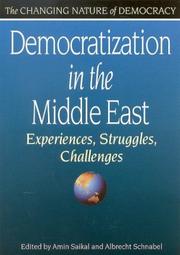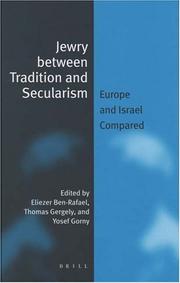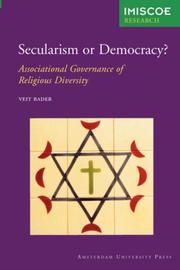| Listing 1 - 10 of 18 | << page >> |
Sort by
|
Book
ISBN: 0773596739 9780773596733 9780773596740 0773596747 9780773544420 0773544429 9780773544437 0773544437 Year: 2014 Publisher: Montréal, Québec : McGill-Queen's University Press,
Abstract | Keywords | Export | Availability | Bookmark
 Loading...
Loading...Choose an application
- Reference Manager
- EndNote
- RefWorks (Direct export to RefWorks)
In his native Italy Augusto Del Noce is regarded as one of the preeminent political thinkers and philosophers of the period after the Second World War. The Crisis of Modernity makes available for the first time in English a selection of Del Noce's essays and lectures on the cultural history of the twentieth century. Del Noce maintained that twentieth-century history must be understood specifically as a philosophical history, because Western culture was profoundly affected by the major philosophies of the previous century such as idealism, Marxism, and positivism. Such philosophies became the secular, neo-gnostic surrogate of Christianity for the European educated classes after the French Revolution, and the next century put them to the practical test, bringing to light their ultimate and necessary consequences. One of the first thinkers to recognize the failure of Marxism, Del Noce posited that this failure set the stage for a new secular, technocratic society that had taken up Marx’s historical materialism and atheism while rejecting his revolutionary doctrine. Displaying Del Noce's rare ability to reconstruct intellectual genealogies and to expose the deep metaphysical premises of social and political movements, The Crisis of Modernity presents an original reading of secularization, scientism, the sexual revolution, and the history of modern Western culture.
Civilization, Modern. --- Secularization. --- Civilisation moderne et contemporaine. --- Sécularisation. --- Civilisation occidentale. --- Appropriation and impropriation --- Impropriation --- Secularization --- Church and state --- Modern civilization --- Modernity --- Civilization --- Renaissance --- Law and legislation --- History
Book
ISBN: 2271091322 2271064929 9782271064929 Year: 2007 Publisher: Paris: CNRS,
Abstract | Keywords | Export | Availability | Bookmark
 Loading...
Loading...Choose an application
- Reference Manager
- EndNote
- RefWorks (Direct export to RefWorks)
SÉCULARISATION : « Action de transférer un bien d’Église dans le domaine public. – Action de soustraire une fonction, une institution sociale à la domination, à l’influence religieuse, ecclésiastique, de (la) mettre entre les mains des laïcs, des pouvoirs publics. – Action de donner à quelque chose un caractère laïc, non religieux, non sacré. » MODERNE : « Qui est, a été réalisé depuis peu de temps et souvent d’une manière différente de ce qui avait été fait précédemment et qui est représentatif du goût dominant de l’époque. – Qui ne s’inspire pas des réalisations antérieures par les principes, les règles établies et apporte quelque chose d’inédit, d’original. – Qui se veut à l’avant-garde du progrès, de la mode. » L’époque moderne peut-elle congédier son passé et ne se revendiquer que d’elle-même ? Ou la théorie du progrès historique ne serait-elle qu’un succédané profane des théodicées religieuses classiques ? Et les concepts prégnants de la politique contemporaine ne seront-ils que des concepts théologiques laïcisés ? Hans Blumenberg, Karl Löwith, Carl Schmitt et Leo Strauss, la métaphysique, le droit, la politologie sont au cœur de cet ouvrage dirigé par Michaël Fœssel, Jean-François Kervégan, Myriam Revault d’Allonnes.
Secularism. --- Philosophy, Modern. --- Modernité --- Sécularisation (Théologie) --- Philosophical essay --- Secularism --- Modern philosophy --- Ethics --- Irreligion --- Utilitarianism --- Atheism --- Postsecularism --- Secularization (Theology) --- Philosophy, Modern
Book
ISBN: 9782271079206 2271079209 2271080347 2271083605 2271142261 Year: 2014 Publisher: Paris CNRS Éditions
Abstract | Keywords | Export | Availability | Bookmark
 Loading...
Loading...Choose an application
- Reference Manager
- EndNote
- RefWorks (Direct export to RefWorks)
Avec L’Âge séculier (2007), Charles Taylor couronnait une œuvre consacrée à la genèse de la modernité et à la pensée du multiple. Il reconstituait la diversité des moments et des réflexions qui menèrent à un âge séculier, aux XVIIe et XVIIIe siècles. Mais loin de constituer une synthèse humaniste, laissant derrière lui l’âge théologique, celui-ci éclate à son tour aux XIXe et XXe siècles, par un « effet supernova » comme Taylor l’a joliment appelé, en une multitude de galaxies nouvelles, où les athéismes côtoient des humanismes déistes mais aussi des « retours de Dieu » surprenants d’expressivité. Ce sont les diverses facettes remarquables de cet Âge séculier que traitent les auteurs de ce livre : sa place dans l’œuvre de Taylor, sa théorie complexe de la sécularisation, certains de ses moments historiques, son intérêt – ou non – dans l’actualité des religions. Une confrontation à un maître ouvrage, qui contribue à forger des instruments de pensée permettant de dépasser le conflit entre laïcité intransigeante et « accommodements raisonnables ».
Taylor, Charles --- Religion --- Secularization (Theology). --- Sécularisation (Théologie) --- Philosophy. --- Philosophie --- Taylor, Charles, --- Sécularisation (Théologie) --- Taylor, Charles, - 1931 --- -Religion --- -Taylor, Charles, - 1931 --- -Secularism --- Secularization (Theology) --- Religion and culture --- Philosophy & Religion --- Rationalism --- Philosophy --- humanisme --- religion --- sécularisation --- athéisme --- Taylor --- Secularism
Book
ISBN: 1317160231 1409457419 1299184219 9781409457411 9781472404534 147240453X 9781409457404 1409457400 131716024X 1315574039 9781317160236 9781299184213 Year: 2013 Publisher: Farnham, Surrey. England ; Burlington, Vt. : Ashgate,
Abstract | Keywords | Export | Availability | Bookmark
 Loading...
Loading...Choose an application
- Reference Manager
- EndNote
- RefWorks (Direct export to RefWorks)
As we enter the twenty-first century, the role of religion within civic society has become an issue of central concern across the world. The complex trends of secularism, multiculturalism and the rise of religiously motivated violence raise fundamental questions about the relationship between political institutions, civic culture and religious groups. Contesting Secularism represents a major intervention into this debate. Drawing together contributions from leading scholars from across the world it analyses how secularism functions as a political doctrine in different national contexts put under pressure by globalisation. In doing so it presents different models for the relationship between political institutions and religious groups, challenging the reader to be more aware of assumptions within their own cultural context, and raises alternative possibilities for the structure of democratic, multi-faith societies. Through its inter-disciplinary and comparative approach, Contesting Secularism sets a new agenda for thinking about the place of religion in the public sphere of twenty-first century societies. It is essential reading for policymakers, as well as for scholars and students in political science, law, sociology and religious studies.
Religion and politics. --- Secularism. --- Ethics --- Irreligion --- Utilitarianism --- Atheism --- Postsecularism --- Secularization (Theology) --- Political science --- Politics, Practical --- Politics and religion --- Religion --- Religions --- Religious aspects --- Political aspects --- Religion et politique --- Sécularisation
Book
ISBN: 9782859399757 2859399755 2757427032 Year: 2020 Volume: 19-20 Publisher: Villeneuve d'Ascq : Presses universitaires du Septentrion,
Abstract | Keywords | Export | Availability | Bookmark
 Loading...
Loading...Choose an application
- Reference Manager
- EndNote
- RefWorks (Direct export to RefWorks)
La tâche urgente de notre époque est de remonter aux fondements du laïcisme. Le débat qui eut lieu en janvier 2004 entre Habermas et Ratzinger, publié dans la revue Esprit, met en évidence le caractère central du problème d’un auto-fondement de l’État démocratique dans le cadre d’une pensée laïque. C’est dans un tel contexte que les réflexions de Guido Calogero s’avèrent déterminantes. Élève de Croce et de Gentile, il se nourrit du néo-hégélianisme italien et épouse son exigence d’une pensée parfaitement immanentiste. Il va plus loin encore et déplace le terrain de la réflexion philosophique : la gnoséologie ne peut que conduire la pensée à retomber dans ces formes métaphysiques qu’il s’agit de dépasser. C’est la volonté qui constitue le véritable principe premier, auto-fondateur. Volonté qui échappe à l’irrationalisme comme à l’intellectualisme si l’on retrouve à sa racine le choix fondamental entre l’égoïsme et l’altruisme, choix omniprésent qui se formule à travers l’impératif du dialogue, le devoir de comprendre l’autre : « Ou bien je veux comprendre les autres, ou bien je veux rester seul avec moi-même ». Ce principe du dialogue est le seul principe indiscutable. Une forme de rationalité pratique post-métaphysique redevient pensable. Et c’est dans ce principe du dialogue que résident les fondements de la démocratie. Calogero tient ce pari de donner un fondement autonome à la démocratie sans pour autant arguer de son caractère purement procédural, puisqu’il nous renvoie à l’intériorité propre à tout sujet. Les droits inaliénables peuvent trouver un fondement non-métaphysique et surtout cette règle du dialogue permet de penser une cohabitation des idées et des cultures qui ne soit pas seulement neutralité bienveillante de la part des institutions, mais participation active des citoyens.
Laicism --- Secularism --- Philosophy, Italian --- Laïcité --- Sécularisation --- Philosophie italienne --- Secularism. --- Free thought. --- Freethought --- Thought, Free --- Agnosticism --- Atheism --- Rationalism --- Secular humanism --- Skepticism --- Ethics --- Irreligion --- Utilitarianism --- Postsecularism --- Secularization (Theology) --- dialogue --- échange --- discussion --- laïcisme --- tolérance
Book
ISBN: 9781628921786 9781628921809 9781628921793 1628921781 1628921803 9781501308543 1501308548 162892179X 1501322680 Year: 2015 Publisher: New York : Bloomsbury Academic,
Abstract | Keywords | Export | Availability | Bookmark
 Loading...
Loading...Choose an application
- Reference Manager
- EndNote
- RefWorks (Direct export to RefWorks)
"What does it mean for a society to be secular? Answering this question from a philosophical angle, Radical Secularization? delves into the philosophical presuppositions of secularization. Which cultural evolutions made secularization possible? International scholars from different disciplines assess the answers given by many leading philosophers such as, among others, L with, Blumenberg and Habermas (Germany), Gauchet and Nancy (France), Taylor and Bellah (North America). They examine the theory that secularization cannot only be regarded as a cultural change that was forced upon religion from an external source (e.g. science), but should also be considered as a phenomenon triggered by motives internal to religion. If religions are indeed capable of inner transformations, the question arises whether religions can persist in the secular societies they inadvertently helped to bring about, and how secular societies may accommodate religion."--Bloomsbury Publishing.
Sociology of religion --- Secularism. --- Secularization. --- Civilization, Secular. --- Religion. --- Religions. --- Sécularisation --- Civilisation laïque --- Religion --- Religions --- Sécularisation --- Civilisation laïque --- Comparative religion --- Denominations, Religious --- Religion, Comparative --- Religions, Comparative --- Religious denominations --- World religions --- Civilization --- Gods --- Religion, Primitive --- Atheism --- Irreligion --- Theology --- Secularism --- Appropriation and impropriation --- Impropriation --- Secularization --- Church and state --- Ethics --- Utilitarianism --- Postsecularism --- Secularization (Theology) --- Law and legislation --- Secular civilization
Book
ISBN: 2868479944 2753523959 9782868479945 Year: 2004 Volume: *38 Publisher: Presses universitaires de Rennes
Abstract | Keywords | Export | Availability | Bookmark
 Loading...
Loading...Choose an application
- Reference Manager
- EndNote
- RefWorks (Direct export to RefWorks)
La France est le seul pays d’Europe où l’État et les Églises sont le plus strictement séparés depuis la loi de 1905. Si on fait de cette loi la lointaine conséquence des rapports tumultueux entre l’Église catholique et la Révolution française, on oublie trop que, dès la seconde moitié du xviiie siècle, la France fut le pays où l’influence du clergé sur la population s’effrita, diminua et parfois s’évanouit. Cela tint au mouvement de la société qui conduisit une partie de la bourgeoisie à refuser la place seconde que lui fixait l’Église dans le corps social, aux frictions entre le clergé et les masses paysannes dans certaines régions, au discrédit de l’Église, effet de sa lutte interne entre jansénistes et anti-jansénistes menée sous l’œil goguenard des philosophes. Sur tous les fronts de combat un personnage nouveau entra en scène, qui concurrença le prêtre dans son rôle de guide des consciences : l’avocat. Les luttes politiques de la fin de l’Ancien Régime firent de lui le porte-parole des mécontents, traduisant leurs griefs et leurs revendications en termes politiques. À la veille de la Révolution, la croyance religieuse commençait à se transformer en opinion privée. Dans les autres pays de l’Europe catholique, on assista à un processus inverse. Le choix obligé fait par les souverains absolutistes éclairés de transformer le fonctionnement de l’État mais sans envisager jamais de toucher à l’ordre social, leur incapacité à améliorer les conditions de vie du plus grand nombre tout en agressant leurs croyances et leurs pratiques, entraîna la constitution d’un front du refus unissant les groupes sociaux les plus divers et aux intérêts matériels souvent antagonistes. Le clergé en fut l’organisateur et porte-parole naturel et renforça son magistère spirituel. L’Absolutisme éclairé fut un échec. C’est sur ce même front du refus que devait se construire la Contre Révolution après 1789. Philippe Goujard est professeur d’Histoire moderne à l’université de Rouen où il…
Church and state --- Secularism --- Eglise et Etat --- Sécularisation --- Catholic Church --- History --- Eglise catholique --- Histoire --- European history --- Catholic religion --- 18th century --- Religion --- Philosophy & Religion --- Christianity --- 27 "17" --- Kerkgeschiedenis--18e eeuw. Periode 1700-1799 --- Sécularisation --- Church and state - Catholic Church - History - 18th century --- Church and state - Europe - History - 18th century --- Secularism - Europe - History - 18th century --- XVIIIe siècle --- histoire des institutions --- Église catholique --- histoire des religions

ISBN: 9280810855 0585485585 9780585485584 9789280810851 9789280870428 9280870424 1281253170 9781281253170 9786611253172 Year: 2003 Volume: *1 Publisher: Tokyo : ©2003 United Nations University Press,
Abstract | Keywords | Export | Availability | Bookmark
 Loading...
Loading...Choose an application
- Reference Manager
- EndNote
- RefWorks (Direct export to RefWorks)
This title addresses a number of issues determining the success or failure of sustainable democratization in the region. Drawing on analyses of Iran, Iraq, Jordan, Lebanon, Syria, Algeria, Libya, Morocco and Tunisia, it examines patterns of democratization, and political and economic transition.
Democracy --- Democratization --- Peace --- Secularization --- -Democracy --- -Peace --- -Secularization --- -Appropriation and impropriation --- Impropriation --- Church and state --- Coexistence, Peaceful --- Peaceful coexistence --- International relations --- Disarmament --- Peace-building --- Security, International --- War --- Self-government --- Political science --- Equality --- Representative government and representation --- Republics --- Democratic consolidation --- Democratic transition --- New democracies --- Law and legislation --- Démocratisation --- Démocratie --- Paix --- Sécularisation --- Appropriation and impropriation --- Middle East

ISBN: 9004151400 9789004151406 9786611399269 1281399264 9047409647 Year: 2006 Volume: 6 Publisher: Leiden ; Boston : Brill,
Abstract | Keywords | Export | Availability | Bookmark
 Loading...
Loading...Choose an application
- Reference Manager
- EndNote
- RefWorks (Direct export to RefWorks)
Jews --- Judaism --- Secularism --- Juifs --- Judaïsme --- Judaisme --- Sécularisation --- Identity. --- History --- Identité --- Histoire --- Judaism and secularism --- Orthodox Judaism --- 296 --- Religions --- Semites --- Secularism and Judaism --- Jewish sects --- Ex-Orthodox Jews --- Hebrews --- Israelites --- Jewish people --- Jewry --- Judaic people --- Judaists --- Ethnology --- Religious adherents --- Identity --- Relations&delete& --- Nontraditional Jews --- Judaïsme. Jodendom --- Religion --- Relations --- Judaism and secularism. --- History. --- Nontraditional Jews.

ISBN: 9789053569993 9053569995 904850192X 9789048501922 Year: 2007 Publisher: [Amsterdam] : Amsterdam University Press,
Abstract | Keywords | Export | Availability | Bookmark
 Loading...
Loading...Choose an application
- Reference Manager
- EndNote
- RefWorks (Direct export to RefWorks)
A landmark study offering a unique alternative direction to contain and forestall religious conflict.
Political philosophy. Social philosophy --- Philosophy and psychology of culture --- Religious studies --- Democracy --- Religious pluralism --- Religion and politics. --- Secularism. --- Démocratie --- Pluralisme religieux --- Religion et politique --- Sécularisation --- Religious aspects. --- Political aspects. --- Aspect religieux --- Aspect politique --- Religion and politics --- Secularism --- Ethics --- Irreligion --- Utilitarianism --- Atheism --- Postsecularism --- Secularization (Theology) --- Pluralism (Religion) --- Pluralism --- Religion --- Religions --- Political science --- Politics, Practical --- Politics and religion --- Religious aspects --- Political aspects --- sociology --- secularism democracy religion multiculturalism associational governance philosophy, law history --- sociologie
| Listing 1 - 10 of 18 | << page >> |
Sort by
|

 Search
Search Feedback
Feedback About UniCat
About UniCat  Help
Help News
News